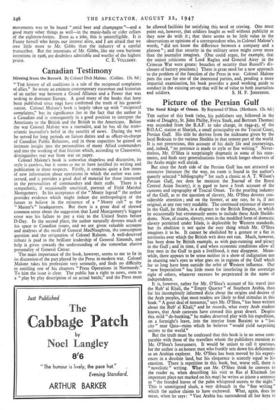Canadian Testimony
Missing from the Record. By Colonel Dick Malone. (Collins. 12s. 6d.) "THE history of all coalitions is a tale of the reciprocal complaints of allies." So wrote an eminent contemporary statesman and historian of an earlier war between a Grand Alliance and a Power that was seeking to dominate Europe. A good many of the books that have been published since 1945 have confirmed the truth of his general- isation. Colonel Malone's book is largely taken up with " reciprocal complaints," but its significance lies in the fact that the author is a Canadian and is consequently in a good position to interpret the Americans to the British and the British to the Americans. Before the war Colonel Malone was a journalist, and he has all the trans- atlantic journalist's belief in the sanctity of news. During the war he served for long periods on liaison duties and as officer-in-charge of Canadian Public Relations, and in these capacities he gained an intimate insight into the personalities of many Allied commanders and into the working of that friction which, according to Clausewitz, distinguishes real war from war on paper.
Colonel Malone's book is somewhat shapeless and discursive, its style is careless, but it seems to me to have justified its writing and publication in three respects. Firstly, it contains quite a few items of new information about operations in which the author was con- cerned, and it provides a good deal of material for those interested in the personalities of commanders and their staffs. There is a sympathetic, if occasionally uncritical, portrait of Field Marshal Montgomery. In his acceptance of the " Monty legend " the author provides evidence which might induce the anthropologist of the future to believe in the existence of a " Monty cult " at the " Master's " headquarters. But there is a great deal of shrewd common sense about the suggestion that Lord Montgomery's biggest error was his failure to pay a visit to the United States before D-Day. In the second place, the author naturally devotes much of his space to Canadian issues, and we are given valuable accounts and analyses of the recall of General MacNaughton, the conscription question and the resignation of Colonel Ralston. A well-deserved tribute is paid to the brilliant leadership of General Simonds, and help is given towards the understanding of the somewhat elusive personality of General Crerar. The main importance of the book, however, seems to me to lie in its discussion of the part played by the Press in modern war. Colonel Malone takes his profession very seriously, and finds no difficulty in entitling one of his chapters " Press Operations in Normandy." To him the issue is clear. The public has a right to news, even to a " play by play description of an actual battle," and the Press must be allowed facilities for satisfying this need or craving. One must point out, however, that soldiers fought as well without publicity as they now do with it ; that there seems to be little value in the observations or opinions of a correspondent who, in Colonel Malone's words, " did not know the difference between a company and a platoon " ; and that security in the military sense might cover more than the journalist imagines. (One could argue, for example, that the unjust criticisms of Lord Raglan and General Airey in the Crimean War were greater breaches of security than Russell's .dis- closure of battery positions.) There is great need for a new approach to the problem of the function of the Press in war. Colonel Malone puts the case for one of the interested parties, and, pending a more impartial examination, his book provides a good working guide to conduct in the existing set-up that will be of value to both journalists


































 Previous page
Previous page